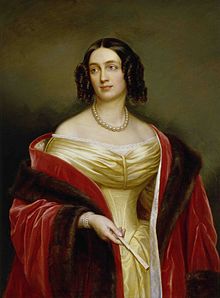Elisabeth Ludovika of Bavaria
| Elisabeth Ludovika of Bavaria | |
|---|---|
 |
|
| Queen consort of Prussia | |
| Tenure | 7 June 1840 – 2 January 1861 |
| Born | 13 November 1801 |
| Died | 14 December 1873 (aged 72) |
| Burial | Crypt of the Friedenskirche, Sanssouci Park, Potsdam |
| Spouse | Frederick William IV of Prussia |
| House | Wittelsbach |
| Father | Maximilian I Joseph of Bavaria |
| Mother | Caroline of Baden |
| Religion | Lutheranism |
Elisabeth Ludovika of Bavaria (13 November 1801 – 14 December 1873) was a Princess of Bavaria and later Queen consort of Prussia.
Elisabeth was born in Munich, the daughter of King Maximilian I Joseph of Bavaria and his Queen Friederike Karoline Wilhelmine Margravine of Baden. She was the identical twin sister of Queen Amalie of Saxony, consort of King John I of Saxony, and sister of Archduchess Sophie of Austria, mother of Emperor Franz Josef I of Austria and Emperor Maximilian I of Mexico; as well as Ludovika, Duchess in Bavaria, mother of Franz Josef's consort, Empress Elisabeth of Austria (Sisi), who was Elisabeth's godchild and namesake. She was known within her family as Elise.
On 29 November 1823, she married the future King Frederick William IV of Prussia and supported his intellectual interests, namely his attempts at artwork, which he held dear to his heart. She refused to become a Protestant as a condition of her marriage, insisting that she would only convert if she was convinced on the merits of the reformed faith after studying it for herself. It was only 5 May 1830, seven years after her marriage, that Elisabeth formally converted to Protestantism.
Becoming Queen consort of Prussia in 1840, she was never without influence in Prussian politics, where she was active in preserving the close friendship between Prussia and the Austrian Empire.
To Frederick William IV, she was an exemplary wife and, during his long illness, a dedicated nurse. She was initially hostile to her nephew's wife, Victoria, Princess Royal, known within the family as Vicky, but their relationship thawed when Vicky took care of Elisabeth and comforted her during the early painful days of her widowhood. Elisabeth never forgot Vicky's kindness and in her will broke with tradition by leaving Vicky her jewels. These jewels were meant to have been bequeathed to the current Queen, (Augusta of Saxe-Weimar, Elisabeth's sister-in-law, who was by then Prussian Queen and German Empress); this was an offense for which Augusta never forgave Vicky.
...
Wikipedia
